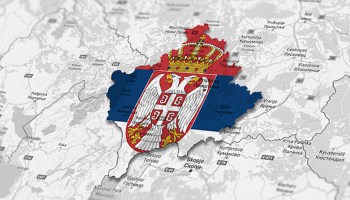by Molly McCluskey
When Kosovo declared its independence from Serbia in 2008, its leaders focused on building a nation. But after the constitution was written, the banking infrastructure put in place and a parliament established, the leaders had to build, or rather rebuild, something else: its reputation.
“I had a girl in summer school in Kosovo the other day who came from Tunisia,” Petrit Selimi, the country’s deputy foreign affairs minister, said at a discussion on the country’s digital diplomacy strategy at Johns Hopkins on Sept. 9. ”She participated in Arab Spring events in her own country and said, ‘I almost didn’t make it because my mom is very worried that Kosovo is a war zone.’ And then she came to Kosovo and she realized that Kosovo is a vibrant society.
“This story has to be told in a way that is not prejudiced or is not portrayed by the others,” Selimi said.
The youngest country in Europe by both date of independence and demographics (though a number of countries still don’t recognize its independence), Kosovo was recently ranked fourth in the world for its digital diplomacy efforts by the Turkish diplomatic publication Yeni Diplomasi, following the United States, the United Kingdom and Israel. It’s a high-tech feat, considering the country’s digital diplomacy staff of three, its limited resources, and its size compared to the countries in the first three slots.
Photo: Johns Hopkins School of Advanced International Studies
Petrit Selimi, deputy foreign affairs minister of Kosovo, left, joins James Barbour, press secretary and head of communications at the British Embassy, for a panel discussion sponsored by the Digital Diplomacy Coalition on the role of social media in promoting his newly independent nation.
But that hasn’t slowed down Selimi, who was passionate and animated as he spoke about Kosovo, speaking in rapid-fire, fluent English that contained a hint of a Norwegian accent and a trace of American slang. Speaking with James Barbour, press secretary and head of communications at the British Embassy, in a panel sponsored by the Digital Diplomacy Coalition, Selimi spoke of the role of social media in claiming space on the global stage.
“We cannot ignore it. It’s so important we get engaged in the global debate that we are not only reacting, but that we are also shaping up the agenda,” he said.
Rather than utilize social media as a series of platforms for politicians to expound upon, Selimi and his digital diplomacy team enlisted their community to spread the word of the country’s personality, accomplishments and promise.
“We don’t try to keep it inside and promote our political agenda using the internet,” he said. “That’s fishy. People don’t like that. Maybe people don’t like you as a member of a certain political party, but they want to get engaged. So we outsourced everything. We gave civil society a role.”
Working with nongovernmental organizations and corporate partners, they created workshops to teach kids how to write and edit Wikipedia articles on everything from the history of Kosovo’s classic music to the national football team, sponsored a photo-sharing contest, and made themselves accessible on a variety of social media, as well as the website Digital Kosovo.
“We have to be sure we employ and use all of our means, so we switch the impression of Kosovo from misperceptions to what’s really happening on the ground,” Selimi said.
What’s happening on the ground is that more and more countries are recognizing Kosovo. Egypt became the 100th country to recognize the five-year-old nation in June 2013, an announcement that was initially made via Twitter. Those recognitions are vital.
Equally important, however, is gaining recognition slowly and methodically, not only from countries around the world, but from global corporations. “We had a 17-year-old kid who managed to convince Twitter to recognize Kosovo as a country,” Selimi said with pride. “LinkedIn just recognized Kosovo. Our big aim is Facebook. And we’re in dialogue with Google as well.”
Also in the works is negotiating a country code, top-level domain. Said Selimi, “I hope within the next six to 12 months we can announce that Kosovo is truly part of the global internet infrastructure.”
Selimi offered this advice to diplomats wanting to engage digitally: “Don’t do things for the sake of digital diplomacy, but whatever you do, have a digital component.”
He added: “We have ministries that are doing very cool stuff, but it’s not reported. And I tell my ministers, if it’s not reported, it’s doesn’t happen. I’m sorry. You confiscated so much drugs from the mafia? That’s great. But can I Google that?”
Selimi and his colleagues use social media as a tool to bring Kosovo to people around the world, and the world to Kosovo. “We try to bring people to Kosovo because that works best,” he said. “People expect one Kosovo, the one with the ’99 war in the background. Refugees. Certain images. Minefields.
“If they come to Kosovo, they will see it is very different, and very likeable.”
Molly McCluskey is an independent journalist dividing her time between Washington, D.C., and Europe. Follow her on Twitter @MollyEMcCluskey.
http://www.washdiplomat.com/PouchArticle/cms/index.php?option=com_content&view=article&id=106












